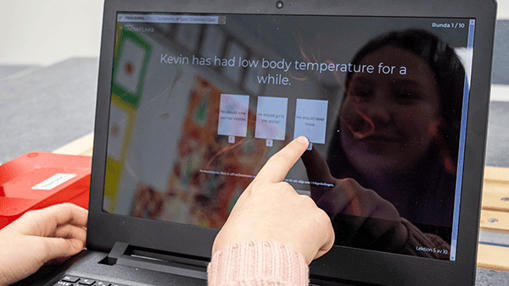NUITEQ Snowflake is an award-winning educational technology software platform that facilitates remote learning and boosts student engagement. Snowflake lesson activities are great for empowering educators, reducing lesson planning time, and allowing teachers to personalize their curricula to meet the diverse learning needs, strengths, and interests of students. NUITEQ spoke to Johannes Nyström, a Special Education Teacher to learn more about the role digital tools play in his teaching.
.jpg?width=600&name=Teacher_Spotlight_2%20(1).jpg)
Q: Which grade(s) and subject(s) do you teach?
A: I teach music and English at Hällsboskolan, a Swedish elementary school in Umeå. The school only accepts children with a developmental language disorder, which means that each of our pupils has special needs and is aided by digital tools to a great extent.
Q: How often do you use digital tools in your existing curriculum?
A: I use digital tools every single day for administrative purposes and lesson-planning. When I teach, I use digital tools a lot. While teaching I might use digital tools to present lesson plans and assignments. Generally speaking, digital tools are essential when teaching my pupils as you need to complement text with visual aids. The pupils also need help when it comes to keeping track of time and instructions. Therefore, I use digital tools on a daily basis while working with my pupils as the challenges the children face are somewhat mitigated by the possibilities that digital tools offer.
Q: Have you seen any changes in student engagement when using digital tools?
A: In general, using digital tools while explaining a lesson plan or assignment has a positive impact on student engagement. All of our pupils have access to computers and iPads at school and they do the majority of their schoolwork using these devices. Although the digital tools we use offer great opportunities for our pupils to work independently and develop in ways they might never do without access to these tools, there are occasions where the digital tools may become a hindrance as well.

Q: Are some students reluctant to use digital tools?
A: Occasionally some pupils are reluctant to use digital tools, but as long as I am present to be able to guide and help my pupils while using digital tools, most of the hurdles can be sorted out. But of course, there is difficulty at times in trying to teach a subject while simultaneously promoting autonomy and independence among the pupils as seemingly minor setbacks can become great obstacles for children with special needs. However, many of our pupils appreciate digital tools because it enables them to listen to texts, learn new words and produce their own texts in ways they might not have been able to do without digital tools.
Q: How do you deal with personalized learning and meeting different student needs?
A: We tend to have a pretty good understanding of the individual needs of our pupils. The possibilities offered by digital tools in terms of personalizing and customizing lessons and assignments are great. It is not uncommon for me to have two or three different lesson plans running at the same time as the needs of our pupils vary heavily. This would be even more difficult if I couldn’t use digital tools to customize these assignments and complement my teaching with visual and structural aids.
Q: Describe the perfect digital tool. Is there a digital tool that doesn’t exist yet which you would like to be able to use in the future?
A: In my mind the perfect digital tool to use in teaching would offer great ”out-of-the-box” functionality but would also need to be customizable to a great extent. To be able to quickly adjust and customize my lesson plans is essential to me. I would also like to be able to quickly adjust which functions and tools my pupils have access to within the digital environment. One pupil might need speech-to-text functionality in order to write a text, while a different pupil might not need it and would only be confused by having that unnecessary function.
Q: What are you struggling with the most right now as a teacher?
A: In general, time-management is always a challenge. Finding the time to do all the things that the job entails while trying to maintain a high level of quality in my teaching is a constant struggle. I’d like to think I get better and better at managing my time in a healthy and effective way, but is it difficult as this line of work is demanding and you constantly need to be flexible and daring to try new things in order to provide the best possible education for your pupils.
Q: How has COVID-19 affected you and your teaching?
A: So far, the effect I feel it has had on me and my job is an ever greater reliance on digital tools to be able to teach and reach out to pupils who are working remotely.
Looking to use technology to improve student engagement? Try NUITEQ Snowflake and gain access to the NUITEQ Snowflake lesson activities for FREE on snow.live.
Not yet a snow.live member? Sign up for the 60-day free trial!


 Sho stick
Sho stick



